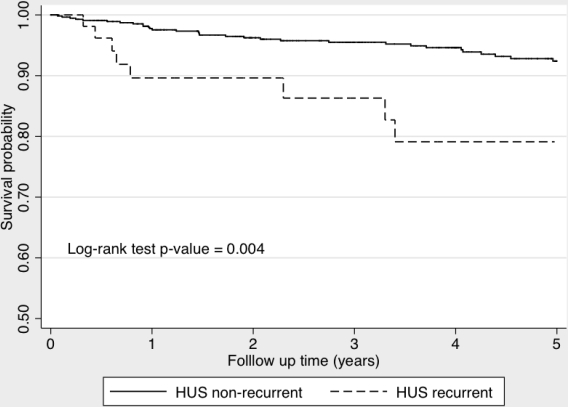Characteristics and Outcomes of Renal Transplant Recipients With Hemolytic Uremic Syndrome: An OPTN Registry Analysis
1Medicine/Nephrology, UT Southwestern, Dallas, TX
2Surgery, UT Southwestern, Dallas, TX
3Medicine/Hematology, UT Southwestern, Dallas, TX.
Meeting: 2015 American Transplant Congress
Abstract number: 360
Keywords: Donation, Hemolytic-uremic syndrome, Kidney transplantation, Recurrence
Session Information
Session Name: Concurrent Session: Glomerulonephritis/Recurrent Disease
Session Type: Concurrent Session
Date: Tuesday, May 5, 2015
Session Time: 2:15pm-3:45pm
 Presentation Time: 3:03pm-3:15pm
Presentation Time: 3:03pm-3:15pm
Location: Room 121-AB
Hemolytic uremic syndrome (HUS) accounts for <1% of renal transplants in the US. There is limited data on the characteristics and outcomes of in pediatric and adult kidney transplant recipients with HUS in the US.
This study included all renal transplant recipients with HUS (N=730) as a cause of end-stage renal disease between 2000 and 2013, using the United Network of Organ Sharing database. The study cohort was divided into two groups (pediatric and adult) and compared based on donor type (deceased and living). Main outcomes were acute rejection, allograft and patient survival, and recurrence of HUS post-transplant.
The acute rejection rates have fallen significantly (<15%) across all groups after 2000. Five-year death censored allograft survival was higher in pediatric living recipients compared to deceased ones (87.6% vs.71.5%, p=0.010), but similar between two donor types in adults (71.2% vs. 71.6%, p=0.086). HUS recurrence occurred in 9.4% of recipients that significantly increased allograft loss (HR=3.0, 95% CI 1.89-4.74). The patient with HUS recurrence had lower allograft (38% vs. 81.5, p<0.001) and patient (79.1% vs. 92.4%, p=0.004) survival rates compared to non-recurrent group at five-year post-transplant.
Overall outcomes of patients with HUS are acceptable and a comprehensive national registry is urgently needed.

To cite this abstract in AMA style:
Tanriover B, MacConmara M, Saxena R, Shen Y-M. Characteristics and Outcomes of Renal Transplant Recipients With Hemolytic Uremic Syndrome: An OPTN Registry Analysis [abstract]. Am J Transplant. 2015; 15 (suppl 3). https://atcmeetingabstracts.com/abstract/characteristics-and-outcomes-of-renal-transplant-recipients-with-hemolytic-uremic-syndrome-an-optn-registry-analysis/. Accessed February 5, 2026.« Back to 2015 American Transplant Congress
